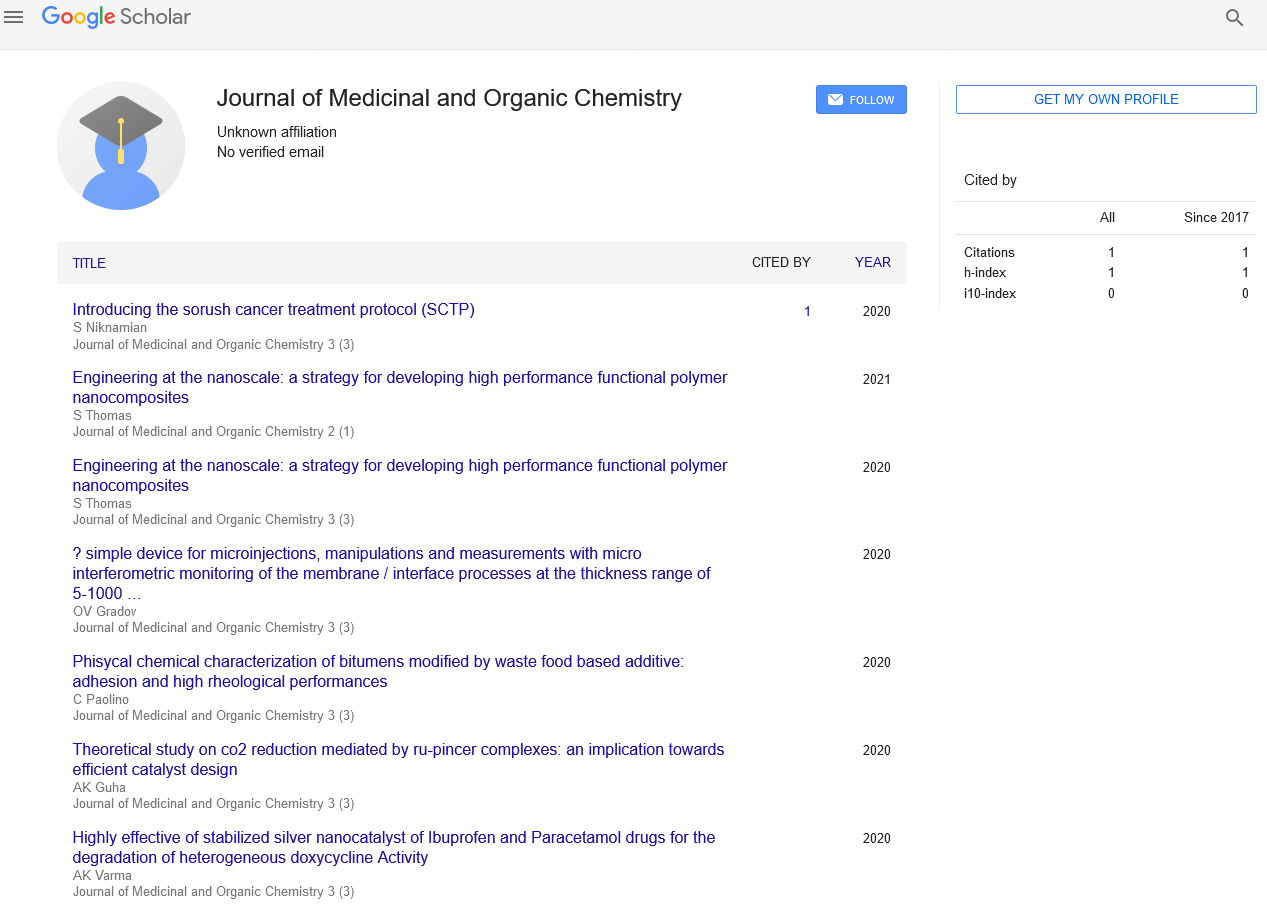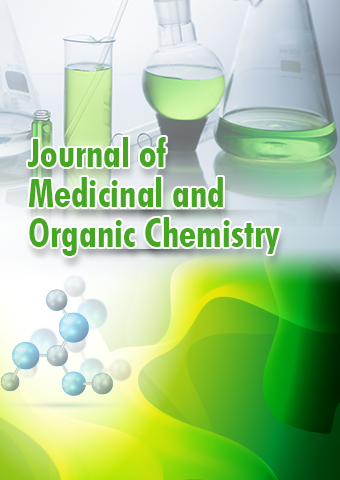Mini Review - Journal of Medicinal and Organic Chemistry (2023) Volume 6, Issue 3
The Intersection of Socio-Economic Research in Organic Chemistry: Towards Sustainable Development
Dr. Vyshali Ganesh*
Department of Organic Chemistry Research, University of RSR technology, India
Department of Organic Chemistry Research, University of RSR technology, India
E-mail: ganesh.v@gmail.com
Received: 02-June-2023, Manuscript No. jmoc-23-101952; Editor assigned: 05-June-2023, PreQC No. jmoc-23- 101952; Reviewed: 19-June-2023, QC No. jmoc-23-101952; Revised: 23- June-2023, Manuscript No. jmoc-23- 101952 (R); Published: 30-June-2023; DOI: 10.37532/jmoc.2023.6(3).76-79
Abstract
This socio-economic research in organic chemistry aims to investigate the impacts and implications of organic chemistry on various aspects of society and the economy. Organic chemistry is a branch of chemistry that deals with the study of carbon compounds and their properties, reactions, and applications. The research explores the intersection of organic chemistry with social and economic factors, such as environmental sustainability, industrial applications, healthcare advancements, and the development of new materials. By analyzing the socio-economic aspects of organic chemistry, this research contributes to a comprehensive understanding of the field’s role in shaping society and the economy, and provides insights for policy-making, investment decisions, and future research directions. Organic chemistry is a scientific discipline that plays a pivotal role in the development of various industries, including pharmaceuticals, agriculture, materials science, and energy. While organic chemistry has traditionally been viewed from a technical and scientific perspective, it is essential to recognize its socio-economic implications. This research paper aims to provide a comprehensive review of the socio-economic aspects associated with organic chemistry, highlighting its contributions to societal well-being, sustainability, and economic growth. The paper begins by examining the role of organic chemistry in the pharmaceutical industry. It explores how the synthesis of organic compounds has facilitated the development of life-saving drugs, addressing public health challenges and improving the quality of life for individuals. Moreover, the economic impact of pharmaceutical advancements and the potential for innovation-driven growth are discussed, emphasizing the significance of organic chemistry in fostering economic prosperity.
Keywords
Organic chemistry • Socio-economic research • Environmental sustainability • Industrial applications • Healthcare • Disease treatment
Introduction
Organic chemistry, as a scientific discipline, is primarily concerned with the study of carbonbased compounds and their properties, structure, composition, reactions, and synthesis. While the field has traditionally been associated with advancements in medicine, materials science, and chemical synthesis, it also holds significant potential for addressing some of the pressing socio-economic challenges facing our world today [1]. In recent years, researchers and scientists have increasingly recognized the importance of integrating socio-economic considerations into organic chemistry research, with the aim of fostering sustainable development and addressing global issues such as climate change, resource scarcity, and social inequality [2]. This article explores the evolving landscape of socioeconomic research in organic chemistry and highlights some of its key contributions to society. Organic chemistry, as a scientific discipline, encompasses the study of carbonbased compounds and their properties, structures, reactions, and synthesis. It plays a pivotal role in various fields, including pharmaceuticals, materials science, agriculture, and environmental sciences. However, beyond its scientific significance, organic chemistry also has socio-economic implications that extend beyond the laboratory [3].
The socio-economic aspects of organic chemistry research involve exploring the broader impacts and applications of organic compounds on society, the economy, and sustainable development. This branch of research investigates how organic chemistry advancements contribute to addressing societal challenges, improving living standards, and driving economic growth [4]. One crucial area where organic chemistry research has profound socio-economic implications is in the development of new pharmaceutical drugs. Organic chemists are involved in the discovery and synthesis of novel compounds that exhibit therapeutic properties, leading to the creation of lifesaving medicines. The impact of these discoveries is enormous, as they contribute to advancements in healthcare, prolonging lives, and improving the quality of life for millions of people worldwide [5].
Moreover, organic chemistry research plays a vital role in the development of new materials, such as polymers, plastics, and composites. These materials find applications in numerous industries, including automotive, aerospace, electronics, and construction. By studying the synthesis and properties of organic compounds, researchers can design materials with enhanced functionalities, durability, and eco-friendliness [6]. This not only drives technological innovation but also fosters economic growth and provides employment opportunities.
Socio-economic factors in organic chemistry research
Socio-economic research in organic chemistry involves the examination of the economic, social, and environmental impacts associated with the development, production, and utilization of organic compounds. It seeks to understand how organic chemistry can contribute to sustainable development, promote social equity, and minimize adverse environmental effects [7]. Some key socioeconomic factors that researchers in organic chemistry consider include:
Green Chemistry: Organic chemists are increasingly embracing the principles of green chemistry, which promotes the design of chemical processes and products that minimize or eliminate hazardous substances, reduce waste generation, and conserve energy and resources [8]. By developing sustainable synthetic routes and adopting environmentally friendly practices, organic chemists aim to reduce the ecological footprint of chemical production processes and improve the overall.
Sustainability of the chemical industry renewable energy and fuels: Organic chemistry plays a crucial role in the development of renewable energy sources and sustainable fuels. Researchers are actively working on the design and synthesis of organic compounds for solar cells, fuel cells, and energy storage devices [9]. These advancements contribute to the transition from fossil fuels to clean energy alternatives, thereby addressing climate change and reducing dependence on non-renewable resources.
Materials science: Organic chemistry has made significant contributions to the development of advanced materials with wide-ranging applications, such as organic semiconductors, polymers, and biodegradable materials. These materials have the potential to revolutionize various industries, including electronics, medicine, packaging, and agriculture, leading to economic growth, improved healthcare, and reduced environmental impact.
Pharmaceutical and healthcare sector: Organic chemistry research has been instrumental in the discovery and development of new drugs and therapeutic agents. Socio-economic considerations are vital in this field to ensure equitable access to healthcare, affordable medicines, and the ethical conduct of clinical trials. By addressing the social dimensions of drug development and healthcare delivery, researchers aim to improve health outcomes and alleviate health disparities across different populations.
Agricultural innovations: Organic chemistry plays a pivotal role in the development of sustainable agricultural practices. Through the design of novel agrochemicals, organic fertilizers, and crop protection methods, researchers strive to enhance food production, minimize environmental pollution, and ensure food security for growing populations. Socio-economic research in this area focuses on balancing the economic viability of agricultural systems with the preservation of ecosystems and the well-being of farmers and rural communities.
Impact and challenges
The integration of socio-economic considerations into organic chemistry research holds immense promise for sustainable development, but it also presents several challenges. Some of these challenges include:
Interdisciplinary collaboration: Conducting socio-economic research in organic chemistry requires collaboration between chemists, economists, sociologists, policy-makers, and other stakeholders. Bridging disciplinary gaps and fostering effective communication among these diverse groups can be a complex task [10].
Economic viability: While sustainability is a critical goal, organic chemists must also consider the economic viability of their research. Balancing environmental and social objectives with the need for commercialization and profitability presents a constant challenge in the development of sustainable organic chemistry technologies.
Conclusion
Socio-economic research in organic chemistry goes beyond the fundamental understanding of chemical compounds and reactions. It investigates the broader impacts of organic chemistry advancements on society, the economy, and sustainable development. Through the development of pharmaceuticals, materials, agricultural innovations, and sustainable practices, organic chemistry research drives socioeconomic progress, improves living standards, and promotes a more sustainable future. This socio-economic research in organic chemistry has shed light on the significant impact of organic chemistry on various aspects of society and the economy. By investigating the interactions between organic chemistry and socio-economic factors, this study has revealed the crucial role played by organic chemistry in addressing global challenges, promoting sustainable development, and driving innovation. Firstly, this research has highlighted the contributions of organic chemistry to various sectors, such as pharmaceuticals, agriculture, energy, and materials science. Organic chemistry provides the foundation for the development of life-saving drugs, crop protection agents, renewable energy sources, and advanced materials. These advancements have not only improved the quality of life for individuals but have also stimulated economic growth and created job opportunities.
This socio-economic research in organic chemistry has highlighted the critical role of organic chemistry in advancing society and the economy. It has emphasized the need for sustainable practices, collaboration, and global cooperation to harness the full potential of organic chemistry for addressing societal challenges and promoting inclusive development. By recognizing the socioeconomic implications of organic chemistry, policymakers, researchers, and industry leaders can make informed decisions and foster a more prosperous and sustainable future. This comprehensive review highlights the significant socio-economic implications of organic chemistry. By examining its contributions to the pharmaceutical industry, agriculture, materials science, energy production, and the need for education, this research emphasizes the importance of recognizing organic chemistry as a critical driver of societal well-being, sustainability, and economic development.
References
- Makam AN, Nguyen OK. An Evidence-Based Medicine Approach to Antihyperglycemic Therapy in Diabetes Mellitus to Overcome Overtreatment. Circulation. 135, 180-195 (2017).
- Booth FW, Chakravarthy MV. Physical activity and dietary intervention for chronic diseases: a quick fix after all. J Appl Physiol. 100, 1439-1440 (2006).
- Roberts CK, Won D, Pruthi S et al. Effect of a short-term diet and exercise intervention on oxidative stress, inflammation, MMP-9, and monocyte chemotactic activity in men with metabolic syndrome factors. J Appl Physiol. 100, 1657-1665 (2006).
- Chandalia M, Lutjohann D, von Bergmann K et al. Beneficial effects of high dietary fiber intake in patients with type 2 diabetes mellitus. N Engl J Med. 342, 1392-1398 (2000).
- Schwartz SE, Levine RA, Weinstock RS et al. Sustained pectin ingestion: effect on gastric emptying and glucose tolerance in non-insulin-dependent diabetic patients. Am J Clin Nutr. 48, 1413-7 (1988).
- Makam AN, Nguyen OK, An Evidence-Based Medicine Approach to Antihyperglycemic Therapy in Diabetes Mellitus to Overcome Overtreatment. Circulation. 135,180-195 (2017).
- Qaseem A, Vijan S, Snow V et al. Glycaemic control and type 2 diabetes mellitus: the optimal haemoglobin A1C targets, a guidance statement from the American College of Physicians. Annals of Internal Medicine. 147, 417-422 (2007).
- Schellenberg ES, Dryden DM, Vandermeer B et al. Lifestyle interventions for patients with and at risk for type 2 diabetes: a systematic review and meta-analysis. Ann Intern Med. 159, 543-551 (2013).
- Schwingshackl L, Hoffmann G, Lampousi AM et al. Food groups and risk of type 2 diabetes mellitus: a systematic review and meta-analysis of prospective studies. Eur J Epidemiol. 32, 363-375 (2017).
- Mannucci E, Giaccari A, Gallo M et al. Self-management in patients with type 2 diabetes: Group-based versus individual education a systematic review with meta-analysis of randomized trails. Nutr Metab Cardiovasc Dis. 32, 330-336 (2022).
Indexed at, Google scholar, Crossref
Indexed at, Google scholar, Crossref
Indexed at, Google scholar, Crossref
Indexed at, Google scholar, Crossref
Indexed at, Google scholar, Crossref
Indexed at, Google scholar, Crossref
Indexed at, Google scholar, Crossref
Indexed at, Google scholar, Crossref
Indexed at, Google scholar, Crossref

